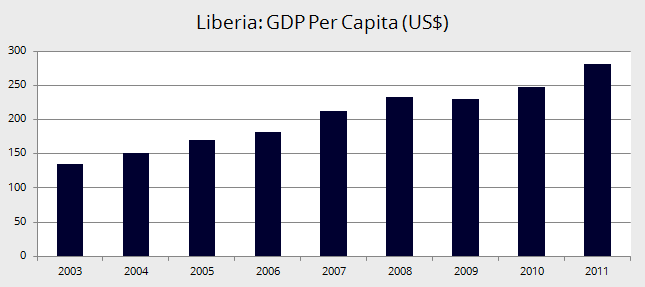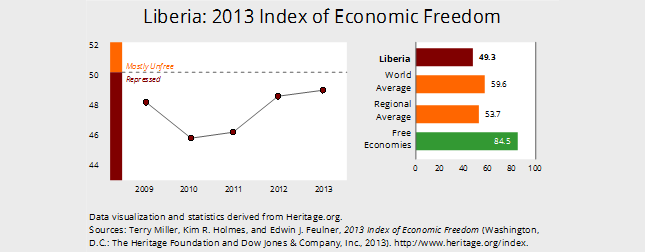BY KRISTA HENDRY AND GEORGE WAH WILLIAMS
Over the past decade, the Liberian economy has rebounded from fourteen years of civil war. Its GDP has had measurable growth since 2004 and the African Development Bank predicts a growth rate of over 7% in 2013. This is in part due to financial and technical aid from donor countries and Foreign Direct Investment (FDI) of international companies in fields like mining, timber, rubber and palm oil. The input of aid in key sectors, such as infrastructure, facilities, and power generation, has the potential to strengthen the economy and raise the income level of the population.
According to the 2013 Index of Economic Freedom, Liberia’s FDI inflow is USD508 million. However, Liberia ranks 147 out of 177 on the index, making it one of the least free economies in the world. In exploring the economic growth in Liberia, it is clear that the majority of it has taken place in the capital, Monrovia, home to an estimated 1.5 million people, making up over a quarter of the population of the country. This number will continue to rise as more people leave the countryside for Monrovia in search of job opportunities and public services, like health and education, which are absent or severely inadequate in much of the rest of the country.
Outside of Monrovia, local communities have a very negative perception of the Liberian economy. The high rate of unemployment, especially among the youth population, and the general lack of opportunities has fostered an increasing sense of unease and discontentment. The current economic snapshot of Liberia varies vastly from the capital to rural communities and from national to international statistics. According to the Central Bank of Liberia, for example, the national unemployment rate has dropped from 85% in 2003 to 3.7% in 2011, making it lower than most Western countries. According to the UNDP’s Human Development Indicators, however, 83.3% of Liberia’s population is living below the international poverty line of $1.25 a day. Reconciling the data published by the Liberian government with statistics put forward by international bodies such as the UN is a nearly impossible job. The discrepancies reflect both on the country’s technical inadequacies as well as the difficulty of gathering and verifying such data, particularly in the rural areas.

The Universal Network of Local Knowledge (UNLocK), a nationwide network of local civil society and community-based organizations, has reported high unemployment, high inflation and a growing sense of economic inequality in the time period of December 2012 to May 2013. Much of the frustration stems from a general lack of knowledge about and involvement with companies that are exploring or making investments in their communities. The major sectors experiencing an influx of foreign private investment are energy, mining, oil, tree crop (timber, rubber and palm oil) sectors – sectors that bring the potential for great wealth but can negatively impact the environment and also have been associated with conflict if not managed properly.
To take advantage of the potential that the abundance of natural resources provides to Liberia, the government must create new regulations and divisions within agencies to monitor the industries. By and large, local communities do not trust that the government will manage these industries in a responsible and equitable way, making it critical that the government demonstrate its transparency and accountability to prevent further tensions between Monrovia and rural communities.
The government has embarked on a relentless campaign of contracts and concessional negotiations in just about every sector without regard to future generations. Despite the influx of FDI, very little benefit has come to ordinary Liberians in terms of jobs and development. Riots and protests across the country are often sparked by the same frustrations: high unemployment, inadequate educational and health facilities, and a virtually non-existent social security system. The government must invest in the expertise necessary to manage complicated bidding processes and contract negotiations. At the same time, it must also handle huge growth in GDP coupled with high expectations on the part of its citizens that this wealth will directly benefit them. Finally, it must also regulate the certain and potential environmental impacts to protect the country’s resource future. History has shown that, in many countries, when these issues are not managed properly, it is the very communities that feel the most negative impacts of extractive operations that also reap the smallest portion of the rewards. The government must make certain that local provinces and counties receive a set percentage of the earnings by government to ensure some of the wealth trickles down from Monrovia to the rural areas. To ensure that local communities benefit more directly there must be a re-engineering of the governance and management of both the County and Social Development Funds.

Regarding the controversial topic of concessions, local communities lack a basic understanding of what concessions are, in general, and in particular details about how they should expect to benefit. Currently, the rumors of development projects and job opportunities are treated with a high level of suspicion as, historically, similar claims have rarely turned out as anticipated. The local demand for direct employment almost always exceeds real opportunities. For Liberia, this is compounded by the lack of technical and vocational programs aligned with market needs. Despite government-sponsored legal stipulations to increase local hiring, top-tier positions require technical and managerial expertise normally only found outside of the county. The hiring of citizens from Ghana, Guinea, Nigeria, and further afield to fill these positions deepens suspicions of unfair labor practices and adds to existing community tensions.
The resentment in the economic sphere and the resultant conflict drivers that have been reported by the UNLocK Network is aimed at both the government and the companies. This is often the case with the extractive industries. Lengthy negotiation processes and lack of transparency (or ability to understand complicated contracts when they are made public) combine to create a sense from communities that government and companies are colluding to take local resources for their own benefit. Public education of civil society about the negotiation process and the resulting deals made between government and investors would help alleviate the distrust and resentment against both companies and governments. Accordingly, a strengthening of the relations between government and the CSOs is imperative in bridging the communications gaps between the State and ordinary Liberians.
According to the UNLocK Network findings, the perception that the companies and the government are neglecting the communities in Liberia is rampant. Expectations need to be better managed to prevent the kind of disappointment that can lead to clashes between companies and communities. Regional land planning meetings with public involvement can help to manage expectations about the amount and timing of infrastructure development that can be expected. Company representatives must also make an effort to present clear information regarding the expectations the local communities should have regarding employment and other opportunities to benefit. Companies should develop strategies with local community members to increase the amount of goods and services that can be provided to their operations by local suppliers. Communities currently report that they feel left out of the decision-making process and it is creating a large amount of resentment, which could exacerbate conflict between communities and companies at the local level. While in certain counties, such as Grand Gedeh and Nimba, there have been some small-scale, citizen-driven initiatives formed around encouraging corporate social responsibility and educating local communities on good practices, these actions remain largely ad hoc with little to no participation from the government or companies.
Improved transparency and the management of expectations can help to decrease the risk of conflict, but companies and the government should be concerned with how local security will react to conflict or violence. The weaknesses in the public security sector must be addressed to ensure that incidences of peaceful or violent protest are dealt with appropriately. As it currently stands, there are serious problems with police recruitment, training and retention and, more often than not, the United Nations forces (UNMIL) or private security providers are looked to as the more effective and legitimate brokers of citizen protection. The extractive sector (specifically oil and mining companies) have developed the Voluntary Principles on Security and Human Rights (VPs) as a framework and initiative to, in part, support improvements in the public security sector which can, for example, greatly reduce the risk that a protest leads to an inappropriate use of force and the potential for greater violence and human rights abuses. Vigilante justice has risen in recent years, due in large, to public distrusts for security and judicial interventions. The government should engage all the companies in the extractive sector; including and beyond oil and mining, and its own agencies tasked with overseeing public security to review how the VPs can be meaningfully implemented in Liberia. The VPs provide a resource for the public security sector reform that the government has acknowledged is needed.
The poor state of economic development in rural areas of Liberia continues to exacerbate the mistrust of the government due to incidences of exposed corruption and the high number of unskilled youth, and has the potential to create conflict in other ways. Without access to sustainable livelihoods, communities may increasingly turn to informal or illicit economies, which can also lead to increased instability and the potential for violence as it undermines the legitimacy of local and state government. A growth in illicit economies and the violence that often surrounds black market activities further necessitates a well-trained and transparent public security force that is seen as accountable to both the citizens and the government, again highlighting the need for increased attention to security sector reform. As it currently stands, public security is sorely lacking and widely mistrusted in many communities outside of Monrovia and most local populations avoid turning to the police for protection or the judicial system for arbitration and adjudication.
Despite the economic growth, Liberia still requires direct economic assistance from the international donor community. Donor assistance should be conditional on continued improvements in areas that will most greatly impact the country’s ability to continue to attract foreign private investment and develop more local companies for a robust local economy. The major issues as noted by UNLocK participants are land ownership and valuation, infrastructure development, educational opportunities, greater government transparency and accountability, and security sector reform. These issues should be addressed not only with the ownership of government but the involvement of international investors, local entrepreneurs, civil society, and communities, as appropriate. If the country can get economic development right, while the international community is still providing development assistance, it will move away from its dependence on aid and greatly reduce the potential of a return to conflict.
In workshops in Nimba and Grand Gedeh, several UNLocK participants described how large tracts of land between the two counties had been declared a nature reserve by the Liberian government. This designation made the land, traditionally used by a sub-set of a particular tribe, unusable for grazing and herding. Later, they maintain, a foreign company was given access to this “nature reserve” to assess the availability and quality of natural resources. Even just the perception of the government targeting a group, taking away their access to lands they have traditionally used under the guise of creating a nature reserve, and then allowing a company to explore in that area can create conflict.
Participants also reported that those living on the property were relocated. Members of this sub-tribe felt their group was being specifically targeted by the government. They perceive that larger and formally recognized tribes have more opportunities to lobby the government to protect their interests. The inability to use the land for their traditional purposes is purportedly causing this tribe, or sub-tribe as some consider them to be, to experience food shortages. In addition, because the forest is located in an extremely remote part of the county, local community members now have to travel much further distances to obtain food and other supplies. This is causing sometimes serious health implications, particularly for women and children.
